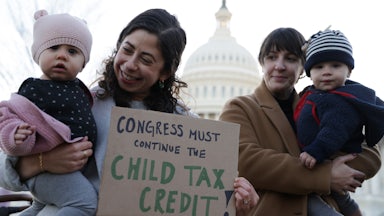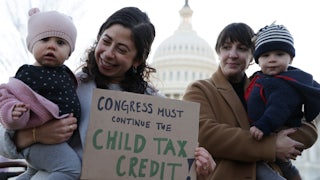It’s often said that every crisis begets an opportunity, and while it’s eminently reasonable to wish for less distressing times, the Covid-19 pandemic helped to illuminate numerous frailties within our society, from public health institutions to the labor market to voting infrastructure. It turned out that there was a lot to fix; President Joe Biden ran on fixing quite a bit of it, and Democrats enacted some policies that achieved groundbreaking results. That’s why it’s so disappointing to see some of these hard-won gains get reversed. One reversal in particular that stands out is the expanded child tax credit, or CTC, which Congress passed as part of 2021’s American Rescue Plan Act and failed to extend at the end of the year.
The result, most importantly, is that Americans in economic straits are being shoved back toward the cliff. But this is also a story of political folly—of Democrats once again snatching defeat from the jaws of victory.
In This Will Not Pass, their new book on the 2020 election and the first year of the Biden presidency, Jonathan Martin and Alex Burns capture the mood in Washington as the rescue plan was signed into law. Democrats celebrated. Senate Majority Leader Chuck Schumer said the law was “one of the most important things we’ve done in decades.” His counterpart, Mitch McConnell, “sensed a potential sea change as well.”
Talking with a friend a few weeks after Biden signed the rescue bill into law, McConnell confided that he was deeply concerned that the Democratic legislation could have such far-reaching effects on the country that would make it hard for Republicans to undo benefits like the child tax credit even if they retook Congress in 2022. If Americans grew used to the benefits in the new law, he suggested, it would become politically untenable for Republicans to repeal its most popular measures.
The Democrats had done the smart thing, both in terms of policy and politics: They expanded the size and eligibility of the credit, while also changing its disbursement schedule from an annual lump sum to a monthly check. The latter move made it much more convenient for struggling households to incorporate into their budgets.
The result was vastly beneficial: In the six months of the expanded CTC, the overall rate of child poverty in the United States was slashed by 30 percent; food insufficiency was cut by 26 percent. An August report from the Niskanen Center predicted that the CTC would “boost consumer spending by $27 billion, generate $1.9 billion in revenues from state and local sales taxes, and support over 500,000 full time jobs at the median wage.”
That’s why the expansion put fear in the hearts of Republican leaders like McConnell. But it turned out that the Kentucky Republican had an ally across the aisle, at least on this issue: West Virginia Senator Joe Manchin. Manchin waged a one-man war against the CTC, a months-long campaign in which he made various demands of his fellow Democrats and then pulled the rug out from under them after those demands were met. It didn’t much matter to Manchin that the end of the expanded CTC fell heavily on his own constituents, nor that his supposedly sincere concerns—that the expanded credit would lead recipients to drop out of the workforce—weren’t backed by evidence.
And so what the expanded CTC had done was very quickly undone. As The Washington Post’s Jeff Stein gravely noted in March, three months after its expiration, nearly four million children had been “thrust back into poverty,” the child poverty rate was up more than 40 percent, and any momentum behind reviving the measure was dead.
Voters seem poised to punish Democrats for it: As The Morning Consult’s Eli Yokley reported a month ago, “Voters who received expanded child tax credits payments in 2021 ended the year more likely than not to support Democratic candidates for Congress in this year’s midterm elections.” But by April, those voters had swung behind the Republicans. As Yokley noted, “The narrow GOP advantage among this group stands in contrast with Democrats’ lead of 12 percentage points in late December, before the benefit expired.”
It’s hard to know what the future holds for child tax credit recipients. There was a time when Republicans actually made policy and would compete with Democrats to propose solutions to social problems. Mitt Romney, perhaps the last avatar of this kind of conservative, has authored his own CTC expansion, but it hasn’t advanced. More than likely, the tax credit recipients who now plan to vote for Republicans will find out too late that the GOP doesn’t intend to restore the benefits they enjoyed during the first year of the Biden presidency. If Democrats want to avert this fate for these struggling families—or reverse their own electoral fortunes—they will need to do what they should have done from the beginning: pair a popular, life-changing policy with a muscular politics that’s worthy of it.










